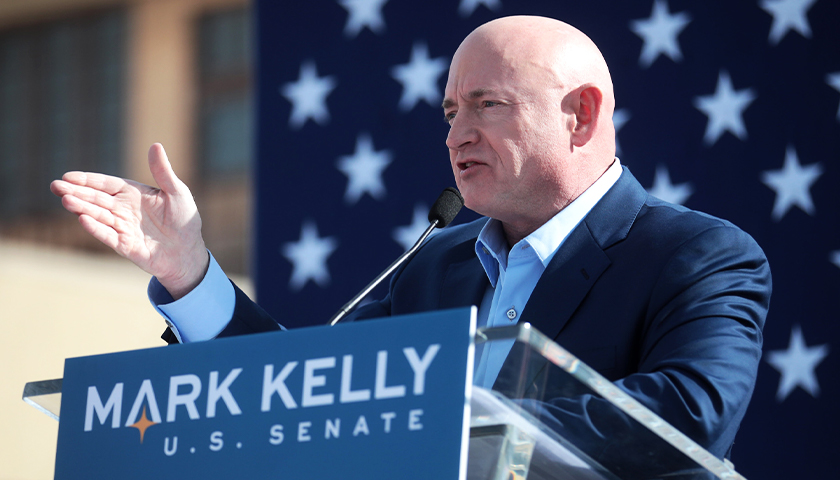Sen. Mark Kelly (D-AZ) joined U.S. Sens. Maria Cantwell (D-WA) and Ron Wyden (D-OR) to co-sponsor legislation that indirectly funds local media. The Local Journalism Sustainability Act establishes tax credits that give consumers a huge deduction on media subscriptions, subsidizes journalists’ salaries, and funds news outlets by paying for businesses to advertise.
Kelly, who is facing a tough reelection race next year with a crowded Republican field including Arizona Attorney General Mark Brnovich stacking up to run against him, said in a statement, “Local newspapers, radio stations and TV stations are pillars of our community, bringing Arizonans trusted local news, information about community events and the latest on public health updates in their area.
The Local News Subscription Credit would cover up to 80% of a local news subscription the first year, or $250. The Local News Journalist Compensation Credit would fund a journalist for $25,000 the first year. The Local Newspaper and Local Media Advertising Credit covers 80% of a business’s advertising costs with the media in the first year, up to $5,000 the first year.
Newspaper associations across the country support the bill. Other supporters include Jennifer Dorning, president of the Department for Professional Employees, AFL-CIO, who said, “The Local Journalism Sustainability Act is critical legislation for journalists and other media professionals, including members of DPE’s unions, working across the news industry at print, digital, and broadcast outlets.”
According to a press release from Wyden’s office, more than 1,800 communities have lost their local newspapers since 2004. Since the COVID-19 pandemic began, 37,000 journalists have lost their jobs, been furloughed, or had their pay cut. However, nearly 2,800 newspaper companies received Paycheck Protection Program loans during the first round of coronavirus relief earlier last year. The Los Angeles Times received $10 million in PPP relief. Cantwell wants $2.3 billion in funding for local media in the infrastructure bill.
Some are critical of the legislation, concerned that it will give the government too much control over the media due to the purse strings. The Center for Innovation and Sustainability in Local Media, which supports the bill, embraces the relationship. “The longstanding symbiotic relationship between local media and elected leaders might make government support to preserve, sustain and build local news more likely,” the organization stated.
However, the Columbia Journalism Review (CJR) is skeptical of intermingling government money with journalism. The news outlet analyzed media outlets in Mexico, which the government partially subsidizes through advertising. CJR found, “During the seven-decade rule of Mexico’s Institutional Revolutionary Party, outlets rarely strayed far from the official line.”
Critics on the right contend that the money will end up funding Democrats. Almost every member of Congress sponsoring the legislation is a Democrat. A study from the Center for Public Integrity found that 96% of donations in the presidential election from those in the journalism field went to Hillary Clinton in 2016, with the remaining 4% to Donald Trump. Townhall contributor Derek Hunter observed at the time, “If there’s one thing this election cycle has exposed it’s just how symbiotic the relationship between the Democratic Party and the media is. Newspapers might as well run Democratic press releases with reporters’ bylines at this point.”
Adam Guillette, the president of Accuracy in Media, asked in in a recent op-ed discussing the idea of bailing out the media industry, “Why should we borrow money from China to fund a failing media company that filed for bankruptcy before the pandemic?”
The Canadian government bailed out the news industry through similar tax credits in 2018, totaling nearly $600 million over five years. The government uses an advisory board to determine which news outlets are eligible for the tax credits. Two of the five members are accused of bias against conservatives.
A version of the bill was introduced in the House of Representatives last month by U.S. Reps. Ann Kirkpatrick, (D-AZ), and Dan Newhouse, (R-WA), HR 3940. They originally introduced it in July 2020, but HR 7640 did not make it out of the House Ways and Means Committee. Kelly is more confident of the bill’s chances this year. He told the Albany Herald, “It always takes work, but, yes, I think we have a good shot at getting it passed.”
– – –
Rachel Alexander is a reporter at the Arizona Sun Times and The Star News Network. Follow Rachel on Twitter. Email tips to [email protected].
Photo “Mark Kelly” by Gage Skidmore (CC BY-SA 2.0).





